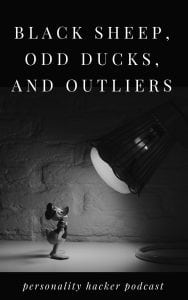Download Episode Here – right click link and select “Save Link As…”
In this episode, Joel and Antonia talk about four ways to cope with being the black sheep, odd duck or outlier in your family or social circle.
In this podcast you’ll find:
The one person in your family who is distinct from all the rest. A significant number of people feel different from the rest of their family.
For instance:
- The only Extravert in a house full of Introverts – or vice versa.
- The only iNtuitive in a family of Sensors – or vice versa.
- The only Thinker in a family of Feelers – or vice versa.
- The only Judger in a family of Perceivers – or vice versa.
This podcast is inspired by Joel’s son Sawyer who is the only Sensor Judger in their family of iNtuitive Perceivers. An ESTJ in a family of ENPs.
- Acknowledge the differences and hold space for those differences.
- Be aware that people around you may not think the same as you.
- Children will often look to their parents to make sure they are acceptable.
- The healthiest frame is to ensure you are making the effort to honor the child’s differences and meet them where they’re at. It’s not a matter of, “You need to fit with us,” but “We need to accommodate you.” The family will unconsciously dogpile upon the outlier. It’s just going to happen. So, accommodate them whenever possible.
- It might not come naturally to you to accommodate a child that is so different from you. If you know your child’s type, help them get into flow by making games of using their driver process. We find Flow by exercising our dominant cognitive function.
- Try not to frustrate their dominant cognitive function. (If you don’t know your child’s personality type, assess their interests and make an educated guess.)
Suggestions for helping the outliers in the family:
- Introverts need alone time. Give them domain where they can be uninterrupted every day.
- Extraverts need outer world stimulation. Set up social options, play, team sports, involvement in group activities, etc.
- Intuitives need to hear that their ideas matter. Don’t tell an Intuitive child that their ideas are unrealistic. Honor their different thought processes and get them tools to build upon their imagination. Say things like, “That’s interesting,” even if you don’t know what they’re talking about.
- Sensors need to know that you honor the things that are important to them. Si would have safety triggers. Se would want more physical activity. Don’t frustrate their need for verifiability.
- Thinkers need info and data. Don’t disregard their need for answers. When a child asks how long till you reach a certain destination, tell them and be as accurate as possible. Don’t call them cold or emotionless because they don’t express emotions the same way. Don’t call them cold-hearted.
- Feelers need connection before information. Don’t treat the Feeler like they are stupid for not acknowledging the importance of data. Don’t underestimate their potential.
- Judgers need to feel things are accomplished and organized. They need to feel they can control their environment. They need domain. They need everyone to be involved in finishing a project.
- Perceivers need freedom in their environment. Chaos doesn’t mean they’re inadequate. Don’t give them the message they are lazy.
What if you are the outlier and nobody accommodates your differences?
- Give yourself permission to show up as you truly are rather than trying to fit in with other’s expectations. If you are the iNtuitive, give yourself permission to talk about things that interest you. If you are a Judger, give yourself permission to organize your environment.
- Protect yourself. Stand up for yourself. “Don’t call me cold-hearted. I’m a Thinker.” “Just because I’m a Feeler doesn’t mean I am stupid.” Set boundaries. Protect yourself from the overt messages you may be receiving, as well as the overt messaging you may be getting subconsciously.
- Proactively communicate your differences. Why do you appear different?
- Find ways to heal the wounds that left you feeling marginalized or different. Sometimes a reframe can be very healing. What are you here to teach the world?
Outliers become very aware of how valuable their perspective is. They realize how valuable a different perspective is and can use that to help them find their purpose.
To subscribe to the podcast, please use the links below:
Subscribe with iTunes
Non iTunes Link
Download The Android App
Subscribe on Soundcloud
Subscribe with Stitcher
If you like the podcast and want to help us out in return, please leave an honest rating and review on iTunes by clicking here. It will help the show and its ranking in iTunes immensely! We would be eternally grateful!
Want to learn more?
Discover Your Personal Genius
We want to hear from you. Leave your comments below…



Share:
Podcast - Episode 0129 - Cutting Cords Of Attachment
Podcast - Episode 0131 - Generational Theory with Jessie Newburn
8 comments
I’ve said it before, & I say it again – you guys are the best!! Loved loved LOVED this podcast. I appreciated you starting off with the perspective that the odd duck is someone in my group; because I grew up feeling like the outlier in many ways, my tendency is still to come at topics like this from that same perspective. It’s one of those old tapes that starts running in spite of all the progress I’ve made past that history. It felt good to start off by thinking about how to apply your ideas to the people I interact with, and then have the reminders to give myself permission to be who I am no matter what messages I get (or think I’m getting) from the people around me – and to remember to give the black sheep around me that message.
I wish podcasts didn’t take so long to produce – I would love to listen to you two every day. Thanks a million for making my exercise, house-cleaning, and other dull tasks things I now look forward to! :-)
The only J in our family has been angry with my (presumed) lack of having my stuff adequately together since the womb. This was incredibly helpful and validating. Thank you!
Sawyer sounds a lot like my 15yodd, who tests ISFJ, but I’ve thought she must be ESFJ. The questions, the projects, the stressing out if things aren’t according to patterns, needing to know if things are allowed or safe. ISFJ/ESFJ has Memory, but I’m wondering I’m wondering if maybe she is ESTJ and there is some gender expectation thing going on that makes her seem to show up with Harmony instead of Effectiveness.